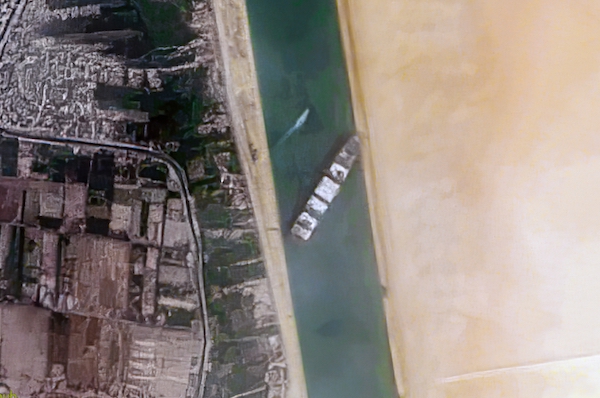What Can We Learn from a Big Boat Stuck in a Canal?
Financiers thinned out our supply chains. That was a risky bet.
...The answer to addressing the problem of thinned out supply chains is to recognize that hyper-efficient globalization inherently carries the downside of unpredictable shortages, geopolitical tension, and supply disruptions. And then redesign our global trading order to make it less efficient and more resilient. There are three basic changes we'll need.
 Container Ship 'Ever Given' stuck in the Suez Canal, Egypt - March 24th, 2021 - CCBY 2.0First, we need to restore anti-monopoly rules, such as antitrust, to prevent the consolidation of production and distribution in the first place. Second, we should re-impose friction, like tariffs, in global trading so that we relocalize production. Trade is generally a good thing, but every country or geographic bloc should be able to provide itself with the essentials, in case there are disruptions. Third, we should rapidly restructure the way that firms finance themselves, so that they have less debt. Debt is a cruel taskmaster, and it leads CEOs to cut deeply not just into fat but into muscle and bone.
Container Ship 'Ever Given' stuck in the Suez Canal, Egypt - March 24th, 2021 - CCBY 2.0First, we need to restore anti-monopoly rules, such as antitrust, to prevent the consolidation of production and distribution in the first place. Second, we should re-impose friction, like tariffs, in global trading so that we relocalize production. Trade is generally a good thing, but every country or geographic bloc should be able to provide itself with the essentials, in case there are disruptions. Third, we should rapidly restructure the way that firms finance themselves, so that they have less debt. Debt is a cruel taskmaster, and it leads CEOs to cut deeply not just into fat but into muscle and bone.
These principles sound simple, and they are, but using them to design a new system will take time and effort. Fortunately, policymakers and business leaders are moving in that direction. There's a rethink of antitrust going on globally, with the most forward looking proposals in the U.S., where they can actually be put into practice. Relocalizing production is also happening. The new CEO of Intel, for instance, marked out an exciting path with a refocus on production of semiconductors in the U.S. and Europe. Finally, changing the way our corporations finance themselves is also on the table; the debt-heavy private equity model is, finally, under attack...
- Tags:
- American Conservative
- American Economic Liberties Project
- anti-monopoly rules
- antitrust
- artificial chokepoints
- continuity of operations
- COVID-19
- debt-heavy private equity model
- disruption to global trade
- efficiency over resiliency
- Ever Given
- Evergreen
- farm equipment manufacturers
- global shipping
- global supply chain system
- Hanjin
- Hatsu
- health care monopolies
- hyper-efficient globalization
- import tariffs
- industrial crashes
- industrial supply chain crash
- Italia Marittima
- Katie Halper
- lack of shipping containers
- Lucas Kunce
- Matt Stoller
- Matt Taibbi
- monopoly power
- operational resilience
- pandemics
- prevent consolidation of distribution
- prevent consolidation of production
- private equity and monopolies in the military defense base
- redesigning globalization
- relocalize production
- resilience
- Suez Canal
- Suez Canal as a chokepoint
- The World is Flat
- Thomas Friedman
- Useful Idiots
- Login to post comments